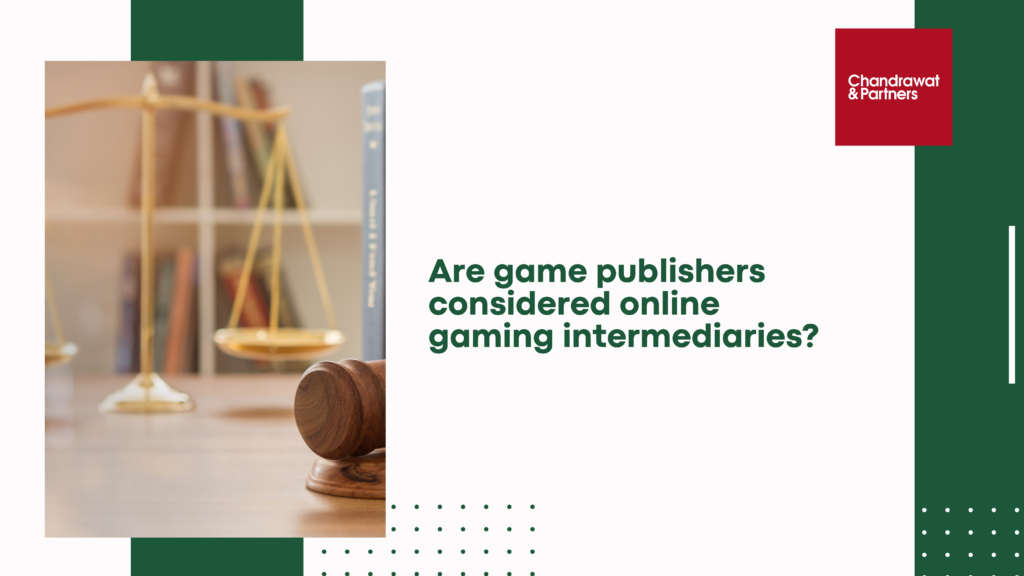Ambiguity Surrounding the Inclusion of Game Publishers as Online Gaming Intermediaries
The draft amendments to the Information Technology (Intermediary Guidelines and Digital Media Ethics Code) Rules, 2021 (IT Amendment Rules, 2023) lacked clarity on whether Online Gaming Intermediaries (“OGIs”) would encompass game publishers, developers, and studios in addition to platforms hosting third-party games. Though Ministry of Electronics and Information Technology (“MeitY”) reportedly clarified during a parliamentary discussion that game publishers would not be considered intermediaries, this raised concerns as it overlooked key stakeholders – the creators of online games.
The broader language used to define OGI in draft amendments suggested two interpretations, with the first being that any intermediary enabling access to online games would qualify as an OGI, including publishers of games.
Potential Impact on Regulatory Framework and Game Publishers
If a broader interpretation is adopted, game publishers may be included as OGIs. However, if they are excluded, the regulatory ambit of the amendment rules could be diluted, as publishers of potentially harmful online games may remain unaffected.
The amendment rules impose responsibilities on OGIs to prevent hosting or sharing non-permissible online games, introducing new obligations. This conservative interpretation of the rules is advisable for stakeholders until the MeitY provides further clarity or a court ruling addresses the matter definitively.
Regulatory dichotomy and the case of Tamil Nadu
Under Entry 34, List II, of the Constitution of India, each Indian state has the power to regulate betting and gambling within such state. This has led to different Indian states coming out with different definitions of betting or gambling. On April 10, 2023, the Governor of Tamil Nadu gave his assent to the Tamil Nadu Prohibition of Online Gambling and Regulation of Online Games Act, 2022 (the “Tamil Nadu Act”).
Once enacted, the Tamil Nadu Act, 2022 will have its own definitions of “online game,” “online gambling” and “online game of chance” as applicable in the state of Tamil Nadu. Therefore, it is within the realms of possibility that an online real money game gets verified by an SRB as permissible under the amendment rules, and yet falls foul of the Tamil Nadu Act, 2022 if it is deemed to be an “online game of chance” under the Tamil Nadu Act, 2022.
Further, although the main feature of the amendment rules is the concept of self-regulation, the Tamil Nadu Act, 2022 contemplates a separate regulatory regime for local online game providers, including a requirement to register with a Tamil Nadu authority.
Responsibilities of Online Gaming Intermediaries
The following applies to all online gaming intermediaries:
- Intermediaries are prohibited from hosting, publishing, or sharing any online game that can cause the user harm or that has not been verified as a permissible online game by an SRB.
- Intermediaries must not advertise or promote on their platform any online game that is not a permissible online game, according to an SRB.
- Intermediaries are responsible for affixing a verification mark issued by an SRB for online games involving real money.
- Intermediaries are required to inform users of the policy for withdrawal or refund of deposit, manner of determination and distribution of winnings and fees and other charges payable.
- Intermediaries are required to set up a robust grievance redressal mechanism, as per prescribed norms. For instance:
- the grievance officer must acknowledge a complaint within 24 hours and resolve it within 15 days from the date of its receipt; and
- persons aggrieved by decisions/inaction of the grievance officer, may appeal to a grievance appellate committee established by the central government.
- Intermediaries are required to obtain know-your-customer details of their users.
- Intermediaries are prohibited from allowing credit or enabling finance facilities to users for the purposes of playing online games involving real money.
Challenges for Non-resident Online Gaming Intermediaries
The amendment rules mandate that each Real Money Intermediary must maintain a physical presence in India. This requirement may compel offshore intermediaries to establish a presence through wholly owned subsidiaries, limited liability partnerships, or branch offices, with considerations related to Indian foreign exchange and tax laws.
Conclusion
The amended rules aim to govern online gaming with a light regulatory touch to be exercised mainly by SRBs. They should introduce uniformity in compliance, however, given that India’s gaming market is expected to grow progressively, ambiguities in the law should be swiftly addressed.
For more information or queries, please email us at
[email protected]






